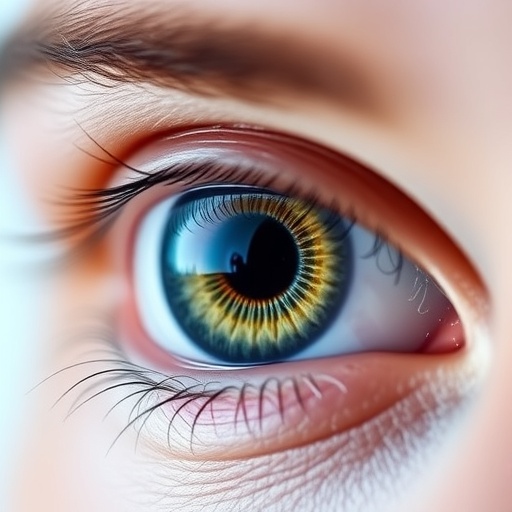As the field of wearable health technology advances, smart contact lenses are stepping into the spotlight as revolutionary platforms for non-invasive ocular diagnostics. Researchers at Istanbul Okan University and Istinye University, particularly under the leadership of Prof. Ali Zarrabi and Dr. Siavash Iravani, have conducted an extensive review on MXene-based smart contact lenses. This innovative research reveals the transformative potential these lenses hold for vision care and ocular health monitoring. The study details how MXenes, which are two-dimensional transition metal carbides, can significantly enhance the functionality of contact lenses through capabilities such as biosensing and therapeutic applications.
The introduction of MXene-based contact lenses brings a new level of multifunctionality to ocular health monitoring. These advanced lenses are equipped to enable real-time tracking of critical physiological parameters such as intraocular pressure (IOP) and glucose levels, crucial for patients managing conditions like diabetes. Additionally, they offer features like photothermal therapy and antimicrobial protection, which are essential for maintaining healthy ocular environments. By merging various health monitoring functions into one device, these smart lenses not only enhance usability but also improve patient compliance and treatment outcomes.
When it comes to performance, transparent MXene films exhibit outstanding electrical conductivity, mechanical flexibility, and biocompatibility, making them ideal materials for the creation of smart contact lenses. The integration of these materials allows for innovative designs that fulfill both the therapeutic and diagnostic needs of users. By leveraging their unique properties, MXenes facilitate a dynamic interchange between the lens and the wearer’s physiological state, enabling the lenses to react and adapt to real-time changes.
One of the groundbreaking aspects of MXene-based smart contact lenses is their therapeutic potential. These lenses can deliver medication directly to the eye, which is particularly innovative for managing post-surgical healing or treating ocular diseases. With the ability to prevent bacterial adhesion and reduce inflammation, MXene coatings enhance the overall efficacy of intraocular lenses and other ophthalmic applications, paving the way for a new era in ocular treatment methodologies.
The innovative design of these smart contact lenses does not stop at therapeutic applications. The incorporation of MXenes empowers the lenses with self-sensing capabilities. For instance, MXene-based micro-supercapacitors and piezoresistive sensors enable continuous monitoring of intraocular pressure without the need for external power sources. Such advancements represent a paradigm shift in how ocular health can be monitored, pointing toward a future where wearables provide seamless health assessments.
Looking ahead, the potential applications of MXene-based smart contact lenses are boundless. Clinical monitoring equipped with this technology has already demonstrated impressive sensitivity and accuracy, with IOP sensors achieving remarkable responsiveness. Coupled with wireless modules that can interact with smartphones, these smart lenses could provide instantaneous health alerts and personalized diagnostics directly to the user’s device, empowering them through timely information about their ocular health.
However, the path to widespread adoption of MXene-based smart contact lenses is not without its challenges. Issues related to long-term biostability, scalability in production, and retention of optical clarity need to be addressed for these devices to become a staple in contemporary healthcare. Researchers are focusing on the development of fluorine-free MXene production methods and optimizing surface functionalization to overcome these hurdles. By addressing these critical issues, the future of smart contact lenses looks promising, with greater accessibility and efficiency on the horizon.
Further exploration is warranted to harness the full spectrum of MXene technology in ophthalmic medicine. Innovations around integrating artificial intelligence with smart contact lens systems can enhance user interaction and data analysis, thus opening doors to more personalized healthcare experiences. This could revolutionize how patients interact with their medical information, leading to more informed health management decisions.
Ultimately, the emergence of MXene-based smart contact lenses stands as a significant advancement in the realm of digital healthcare. By merging the elements of biosensing, therapy, and user comfort into one coherent wearable platform, they embody a promising frontier in ophthalmic healthcare. This integration of technology not only addresses numerous ocular health challenges but also strives to enhance the quality of life for individuals reliant on corrective lens solutions.
As research continues, the expectations surrounding the capabilities of these smart lenses will likely evolve, reshaping our approach to both vision care and health technology at large. The art of making contact lenses not only corrective but also a powerful health monitoring device may soon become a reality, bringing forth a new dawn in personalized medical solutions.
The journey towards MXene-based smart contact lenses is marked by rigorous research and innovation, underpinning the need for a collaborative approach among scientists, engineers, and healthcare professionals to fully realize the potential these technologies have. With careful dedication to improving material properties and ongoing clinical validation, MXene technology could firmly establish itself in everyday health practices.
The commitment to enhancing ocular health through inventive technologies holds the promise of transforming not just individual care, but also the entire landscape of healthcare. As these MXene-based smart contact lenses progressively make their way into the market, they offer a vivid glimpse into the possible future of treatment paradigms within the realm of vision care, proving that the integration of smart technology into everyday health solutions is not merely a vision—it is rapidly becoming a tangible reality.
Subject of Research: MXene-based smart contact lenses
Article Title: MXene‑Based Wearable Contact Lenses: Integrating Smart Technology into Vision Care
News Publication Date: 5-Aug-2025
Web References: DOI
References: None provided in the content.
Image Credits: Arezoo Khosravi, Atefeh Zarepour, Ali Zarrabi, Siavash Iravani.
Keywords
MXenes, smart contact lenses, ocular health, biosensing, therapy, wearable technology, real-time monitoring




